|
|
|
Sort Order |
|
|
|
Items / Page
|
|
|
|
|
|
|
| Srl | Item |
| 1 |
ID:
131029
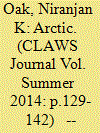

|
|
|
|
|
| Publication |
2014.
|
| Summary/Abstract |
Regionalism as a political project has been a signi?cant phenomenon in post-1945 international relations. The third phase of regional integration began towards the end of the 19805 within the international context created by the end of the Cold War. Academics dubbed it as "new regionalism".' Most of the regional organisations that came up in those days were based on economic cooperation among the states. It was an era of globalisation. The Arctic Council (AC) which emerged in 1996 was a unique case. The 'Arctic' has emerged as a region in international cooperation during the past 20-30 years, as manifest in the creation of the AC. The objective of the AC was sustainable development and environmental protection only, and that is why it may be termed as a unique case in that period.
|
|
|
|
|
|
|
|
|
|
|
|
|
|
|
|
| 2 |
ID:
131031
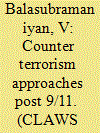

|
|
|
|
|
| Publication |
2014.
|
| Summary/Abstract |
Most studies on terrorism and political violence by experts and researchers have focussed on the causation factors of terrorism over the years. A majority of the scholarly works has mostly focussed on the historical, ideological, and etiological aspects of terrorism and insurgency. Scholars, researchers and investigators have attempted to epitomise and de?ne terrorism as a phenomenon, and have admitted to the problems in ?nding a universally acceptable de?nition. They have primarily focussed on bringing out an acceptable definition of terrorism in all its manifestations and forms, and in the process, have analysed the roots, origins and growth of terrorism. Compared to the enormous literature on the growth and incline of terrorism the world over, studies or scholarly works on the decline of terrorism or insurgency are not as vast and are limited in number.' A few experts like Martha Crenshaw and Audrey Cronin have dealt with this aspect in detail.' However, these attempts comprise only a fragment of the total terrorism literature in place.
|
|
|
|
|
|
|
|
|
|
|
|
|
|
|
|
| 3 |
ID:
130962
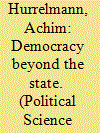

|
|
|
|
|
| Publication |
2014.
|
| Summary/Abstract |
MODERN DEMOCRACY IS, ABOVE ALL ELSE, a procedural ideal. To be sure, high substantive hopes are often placed in democracy. Yet the essence of democracy lies not in the specific outcomes that it may (or may not) help reach, but in a set of procedures that ensure, in the words of Philippe Schmitter and Terry Karl, that "rulers are held accountable for their actions in the public realm by citizens," who act primarily "through the competition and cooperation of their elected representatives."1 Historically, the main political arena in which democratic procedures have been implemented, and the main reference point for democratic theory, has been the state. According to a well-established argument, the democratization of non-state entities-such as international and supranational organizations or transnational networks with various degrees of institutionalization-is therefore faced with significant conceptual and practical challenges.2 This article seeks to assess the severity of these challenges: Can democratic procedures be transferred to political entities "beyond the state," or is democracy doomed to failure in non-state contexts?
|
|
|
|
|
|
|
|
|
|
|
|
|
|
|
|
| 4 |
ID:
132895
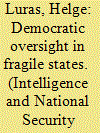

|
|
|
|
|
| Publication |
2014.
|
| Summary/Abstract |
In most transition countries the main aim of 'democratizing intelligence' is to weaken the authoritarian governmental structures by introducing more transparency, legality and oversight. In Bosnia and Herzegovina however, the state-building efforts driven by international parties combined formal democratization processes such as independent oversight with the strengthening and operational capacity building of previously weak-to-non-existent intelligence structures. In parallel with the descent into war when Yugoslavia collapsed in the early 1990s, the State Security Service (SDB) in the Republic of Bosnia had split into three ethnically-based outfits answering to the political and military leaders of war. 'Democratization' of intelligence in Bosnia and Herzegovina since the establishment of a unified, state-level Intelligence and Security Agency (OSA) in 2004 has followed its own unique path reflecting the fragmented nature of politics in Bosnia and the leading role of international organizations in proposing and effectuating institutional reforms. Nevertheless, in terms of habits, operational methods and values many Bosnian intelligence officers went through similar adaptations and transitions as their colleagues in countries where institutions at the time of democratic transition were too strong and authoritarian rather than, as in the case of Bosnia, being deemed too weak and ineffectual.
|
|
|
|
|
|
|
|
|
|
|
|
|
|
|
|
| 5 |
ID:
129038
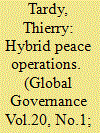

|
|
|
|
|
| Publication |
2014.
|
| Summary/Abstract |
Hybridity is the new term for multidimensional, modular, and multiactor peace operations. Hybrid peace operations bring together several institutions that to an extent cooperate in a joint endeavor. This article aims at unpacking the concept of hybridity by looking at its rationale and challenges. It first examines the typology of peace operations and analyzes the meaning of hybridity. It then looks at why international organizations have hybridized their conflict management policies and contends that further integration is the way forward for legitimacy and efficacy reasons, despite the difficulties encountered by existing hybrid missions. Finally, the article looks at some of the challenges of an increasing integration of institutional actors within peace operations. While integration is a response to the evolution of conflict management needs, it also carries risks ranging from interinstitutional competition to issues of accountability and ownership as well as impacts on the coherence of the global maintenance of international peace and security.
|
|
|
|
|
|
|
|
|
|
|
|
|
|
|
|
| 6 |
ID:
133481
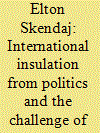

|
|
|
|
|
| Publication |
2014.
|
| Summary/Abstract |
Can international actors build effective state bureaucracies in postwar countries? While the literature on state institutions suggests they are best built under local ownership, this article shows how international actors in collaboration with local actors managed to build two effective state bureaucracies in postwar Kosovo: the police force and the customs service. Contrary to the article's Hypothesis 1 on local ownership, international actors insulated the effective bureaucracies from political and societal influences in order to prevent them from becoming sites of patronage. Thus, these institutions built on meritocratic recruitment and promotion. Employing a comparative research design, the article utilizes national survey data as well as data from 150 semistructured interviews conducted during ten months of fieldwork in Kosovo. By contrasting the state's constituent bureaucracies, which vary in effectiveness, and thus avoiding the reduction of the state to a unitary abstract actor, this research offers a fresh perspective on postwar state building. Furthermore, it contributes three innovative sets of indicators to measure effective bureaucracies: mission fulfillment, penalization of corruption, and responsiveness to the public.
|
|
|
|
|
|
|
|
|
|
|
|
|
|
|
|
| 7 |
ID:
133153
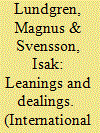

|
|
|
|
|
| Publication |
2014.
|
| Summary/Abstract |
Two characteristics of mediators - bias and leverage - are discussed intensively in the research on international mediation. However, whereas bias and leverage have been examined in mediation by states, relatively little is known about their role in mediation by international organizations (ios). This study provides new ways of conceptualizing io bias and leverage and utilizes unique data to measure the impact of io bias and leverage on mediation outcomes. Exploring all cases of civil war mediation by ios in the period 1975-2004, we find that ios where member states provide support to both sides in a conflict outperform ios whose member states remain disinterested. ios with significant trade leverage also increase the likelihood of mediation success. The study demonstrates that ios rarely have a neutral relationship to civil war combatants, that mediation by ios is laden with member state interests, and that such interests shape outcomes.
|
|
|
|
|
|
|
|
|
|
|
|
|
|
|
|
| 8 |
ID:
133146
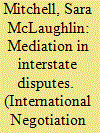

|
|
|
|
|
| Publication |
2014.
|
| Summary/Abstract |
This commentary provides a brief summary of the articles in this special issue and emphasizes four questions raised by this research: 1) ways to define and measure mediators' strategies, 2) teasing out demand side factors from supply side factors in mediation, 3) capturing differences between states and international organizations as conflict managers, and 4) understanding the role of particular conflict management actors like the International Criminal Court.
|
|
|
|
|
|
|
|
|
|
|
|
|
|
|
|
| 9 |
ID:
130930


|
|
|
|
|
| Publication |
2014.
|
| Summary/Abstract |
We argue that system-level international changes have made secessionism more attractive since 1945, and that this is one of the reasons for the recent Proliferation of Aspiring States. Using original data on secessionist movements between 1816 and 2011, we document that secessionism became significantly more common after 1945. Whereas much of the existing literature explains secessionism by pointing to local or unit-level factors, we contend that security, economic, and normative changes at the international level have effectively increased the benefits of independence, without a commensurate increase in the costs. We use interviews with representatives of new states, secessionist groups, and international organizations to provide empirical support for these claims. We conclude by considering three extensions of our argument: (i) Does the nature of the changing international environment affect the way in which secessionists attempt to achieve their goals? (ii) What future changes might amplify or depress this trend? (iii) Who are the specific people benefiting from statehood, and can their position within a would-be state help us understand the nature of secessionism today?
|
|
|
|
|
|
|
|
|
|
|
|
|
|
|
|
| 10 |
ID:
128969
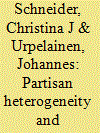

|
|
|
|
|
| Publication |
2014.
|
| Summary/Abstract |
This article analyzes the relationship between partisan heterogeneity and cooperation in international organizations. We argue that partisan heterogeneity increases distributional conflict among states during intergovernmental negotiations, thereby increasing the costs of cooperation. This decreases governments' willingness to contribute to cooperative efforts. We test the theory against data on governments' financial contributions to the European Development Fund. The empirical analyses robustly demonstrate that partisan heterogeneity reduces governments' incentives to contribute to European cooperation on international development. On a more general level, we offer new perspective on the role of domestic politics in international cooperation.
|
|
|
|
|
|
|
|
|
|
|
|
|
|
|
|
| 11 |
ID:
131030
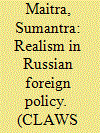

|
|
|
|
|
| Publication |
2014.
|
| Summary/Abstract |
The Crimean crisis marks a pivotal point in the rations between Russia and the West. The revolution in Ukraine, and the subsequent events that unfolded at breakneck pace, including the annexation of Crimea by Russia, throws up a lot of questions, the answers to which will have a massive impact on foreign policy and inter-state relations in the future. It also throws up some broad patterns. The crisis is a worrying return to a trend of land annexation by a great power on a pretext, a trend which was thought to be long dead Munich Conference of 2007. It brings back the debate on the concepts of "Perception and Resolve" in foreign policy. And, perhaps, most importantly, it serves as a vindication of realists over the liberals, constructivists and other paradigms of international relations, and validates the often discussed idea that state interests triumph over every other aspect.
|
|
|
|
|
|
|
|
|
|
|
|
|
|
|
|
| 12 |
ID:
129488
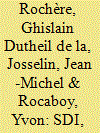

|
|
|
|
|
| Publication |
2014.
|
| Summary/Abstract |
The strategic defense initiative (SDI) intends to renew the leadership of the USA on the western alliance. The initiative takes place in a period when a summation technology prevails for the aggregation of contributions of NATO allies. We investigate if SDI induces a shift in Hirshleifer's social composition function. Panel data tests over the period 1970-1990 do not confirm any break toward a best-shot aggregator. SDI does not alter the core of deterrence. It is indeed a public good at the US level but not at the NATO level, where, it is one of the joint products of the alliance. We also investigate the lessons to be drawn for the current debates on ballistic defense.
|
|
|
|
|
|
|
|
|
|
|
|
|
|
|
|
| 13 |
ID:
129410
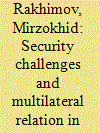

|
|
|
|
|
| Publication |
2014.
|
| Summary/Abstract |
New geopolitics and security Central Asia faced considerable political, social, and cultural changes throughout the whole of the 20th century; since the beginning of the 21st century, the region is confronted to new steps of the geopolitical transformation. Some experts say that Central Asia is returning to the Great Game of the 19th century but with new players. It is well-known that Central Asia historically was in the center or important aspects of interest of different empires and one could say that the region was more or less in Great Game situation during all periods of its history. After the collapse of the Soviet Union, the newly Independent Central Asian republics tried to form new bilateral and multilateral relations and within a short time the Central Asian nations were formally recognized by many countries, which established with most of them diplomatic ties and exchanged diplomatic missions. The region's countries have joined the main international and regional organizations.
|
|
|
|
|
|
|
|
|
|
|
|
|
|
|
|
| 14 |
ID:
133288
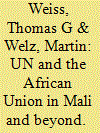

|
|
|
|
|
| Publication |
2014.
|
| Summary/Abstract |
The United Nations (UN) and the African Union (AU) have collaborated in building a viable African Peace and Security Architecture and have worked together in a number of armed conflicts over the past decade. Examples include the peace operations in Burundi and Somalia, and the hybrid peace operation in Sudan's Darfur region which is perhaps the most prominent illustration of this collaboration. Although the UN Security Council authorized the intervention in Libya, which was approved by leading regional organizations (the Arab League, the Organization of the Islamic Conference and the Gulf Cooperation Council), it was opposed initially by the AU although the three African states in the Security Council voted for it. Relations cooled as a result and have grown colder still as the UN snubbed the AU and its initial efforts to engage in post-conflict stabilization in Mali. While the AU sought to prove itself as a capable security provider and partner on the continent with its operation AFISMA, France's Opération Serval and the UN's peace operation for Mali, MINUSMA, bypassed the African Union. This article explores the underlying fault-lines between the two organizations by examining interactions between the UN and AU since the latter's launch in 2002, but focusing on the Mali case. The fault-lines emerging from the analysis are different capabilities, risk-averse vs risk-assuming approaches to casualties, diverging geopolitics and leadership rivalry.
|
|
|
|
|
|
|
|
|
|
|
|
|
|
|
|
| 15 |
ID:
133072
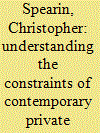

|
|
|
|
|
| Publication |
2014.
|
| Summary/Abstract |
For the secretary-general of the United Nations, Ban Ki-moon, contemporary piracy is nothing less than a "global menace." There are several piracy "hot spots" the world over, each with its own dynamics, but it is Somali piracy that in recent years has particularly caught the attention and raised the ire of states, shippers, and international organizations. International Maritime Organization (IMO) statistics reflect the quantitative dominance of Somali piracy. In 2010 and 2011, the number of alleged attacks in international waters off East Africa and on the Indian Ocean (into which Somali pirates now venture) was 84 percent of the global totals in each year. In 2012, owing to developments both on land and at sea, the Somali weighting declined, but it was still a considerable 54 percent of global totals.
|
|
|
|
|
|
|
|
|
|
|
|
|
|
|
|
| 16 |
ID:
134146
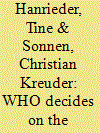

|
|
|
|
|
| Publication |
2014.
|
| Summary/Abstract |
This article analyses the emergency governance of international organizations by combining securitization theory with legal theory on the state of exception. Our main argument is that where issues are securitized as global threats, exceptionalism can emerge at the level of supranational bodies, endowing them with the decisionist authority to define emergencies and guide political responses. We theorize the 'emergency trap', which is triggered when the emergency powers of international organizations reduce the obstacles to, and increase the incentives for, the securitization of further issues. Based on the idea that the emergency trap functions as an institutional driver of securitization, we also highlight the importance of the constitutional containment of emergency competencies as an alternative to discursive desecuritization strategies. We illustrate this security-emergency dynamic in a case study of the recent empowerment of the World Health Organization (WHO) in the governance of global health emergencies. The article shows how WHO's exceptional response to the 2003 severe acute respiratory syndrome (SARS) crisis paved the way for an institutionalization of emergency powers within the organization and contributed to securitizing the 2009 swine influenza outbreak as a global pandemic. However, WHO's crisis governance has also triggered internal and external processes of constitutional contention.
|
|
|
|
|
|
|
|
|
|
|
|
|
|
|
|
|
|
|
|
|